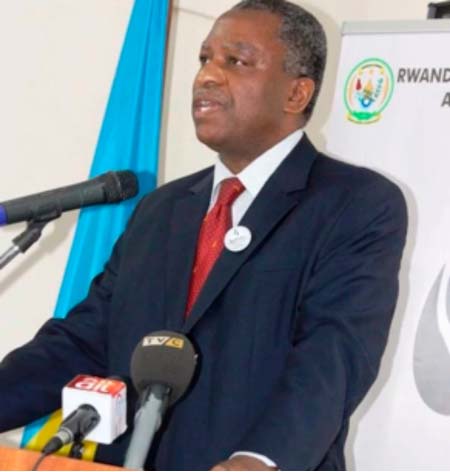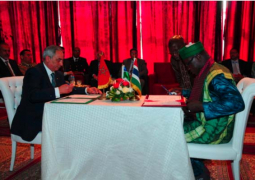
With
barely four days to the inauguration, and with the failure of the last
diplomatic efforts of the West African regional bloc to broker an agreement,
the prospects of diplomatically solving the ongoing impasse is ever dimmer.
In
their second and last attempt at a diplomatic resolution to the political
impasse, Ecowas mediation mission, comprising Nigeria’s President Muhammadu
Buhari, Liberia’s President Ellen Johnson Sirleaf, and Ghana’s ex-President
John Mahama, was in Banjul on Saturday.
The
delegation met with incumbent president Yahya Jammeh, President-elect Adama
Barrow, Chief Justice Emmanuel Fagbenle, and two commissioners of the Independent
Electoral Commission.
At
the end of the daylong mission, the Nigerian foreign minister, Geoffrey
Onyeama, on behalf of the mediation team, said the details of their discussions
with the stakeholders would be presented to the Ecowas heads of state at a meeting
in Bamako, Mali,where the bloc would take a definitive position on the
situation in The Gambia.
He
said Ecowas is determined to find a solution that reflects the will of the
Gambian people, “as expressed in the democratic election recently held”.
Meanwhile,
the delegation left with President-elect Barrow to the Bamako meeting held on
Saturday.
It
is understood that after the meeting, Barrow proceeded to Dakar, Senegal, where
he will be staying until his planned inauguration on 19 January 2017 as the
third president of The Gambia since independence from Britain in 1965.
The
move to Dakar was requested by the West African leaders, according to media
reports.
The
outcome of Saturday’s meeting in Bamako was the same as before: “Jammeh has to step down and hand over power
at the end of the transition.”
But
shortly after meeting the Ecowas mediation mission at the State House in
Banjul, the Jammeh government issued a statement further asserting its call for
new election.
After
ruling The Gambia for 22 years, President Jammeh lost the 1st December
presidential election to Mr Barrow, who leads a coalition of eight opposition
parties. After conceding defeat, Jammeh
rejected the result in its entirety.
Jammeh
and his ruling Alliance for Patriotic, Reorientation and Construction (APRC)
have two pending petitions at the Supreme Court praying for the nullification
of result.
The
session of the court on 10 January could not determine the petitions because
the court could not be empanelled. The
Chief Justice said the Nigerian and Sierra Leonean judges appointed at the
Supreme Court could not make it to Banjul; the earliest time they can come is
May 2017.
The
lawyer representing the ruling APRC party in the election petition case said
the inauguration of President-elect Barrow should wait until the petition is
determined.
But
the spokesperson of Mr Barrow’s coalition, Halifa Sallah, said this is neither
in line with law nor common sense for a losing party to have such a right.
A
private legal practitioner and a member of the Gambia Bar Association, who does
not want to be named, said when the election petition is not finally determined
until 19 January, then the inauguration of the president-elect should be done,
according to law.
Determined
to find a legal recourse to stop the inauguration, the APRC lawyer has filed
for an injunction at the Supreme Court seeking an order to block the
inauguration.
The
call for an injunction is expected to be determined today, Monday.
Meanwhile,
the coalition spokesperson, Mr Sallah, said while the APRC continues to resort
to the court, the coalition is also preparing for Barrow’s inauguration. The coalition is adamant that none of the
legal resorts of the incumbent can deter the inauguration of president-elect
Barrow.
Political
analysts said with the variance in the positions of Jammeh and the coalition,
and the failure of diplomacy to get the incumbent, as the declared loser of the
election, to handover power when due, the possibility of getting the impasse
solved peacefullycontinues to be a challenge.


